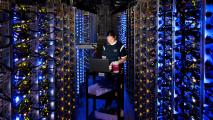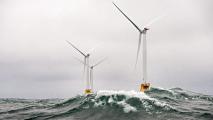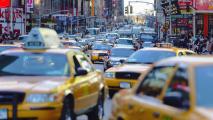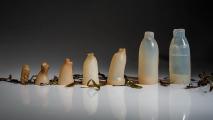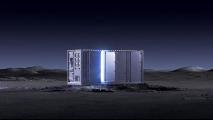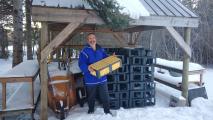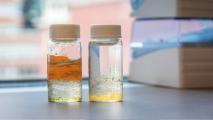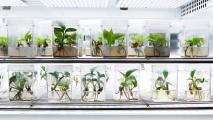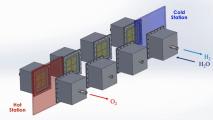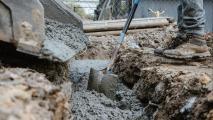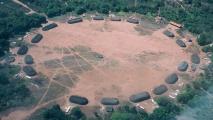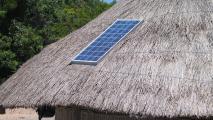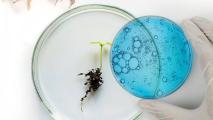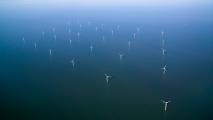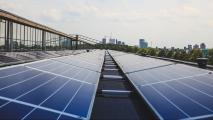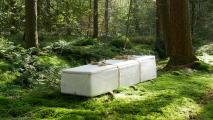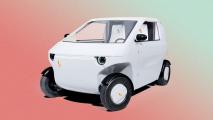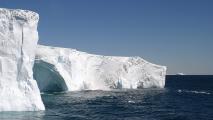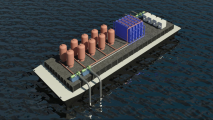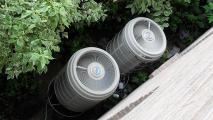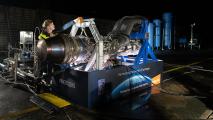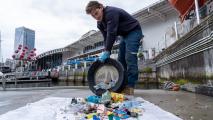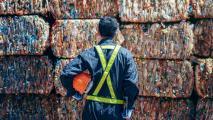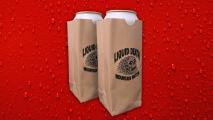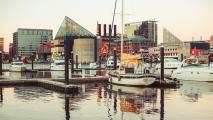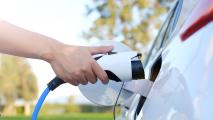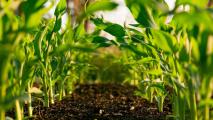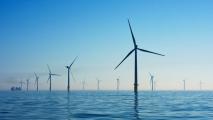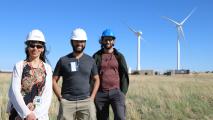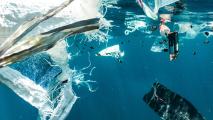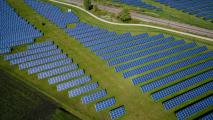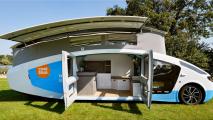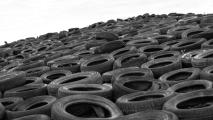Field: Sustainability
Charting the race for energy in the Age of AI
As AI's demand for computing power skyrockets, data centers are under immense pressure to boost efficiency and increase sustainability.
The future of data centers — on land, at sea, and in space
As our digital world grows, demand for data centers is also increasing. To meet that demand sustainably, developers are getting creative.
Boosted Breeding and beyond: 3 tech trends that could end world hunger
A world without hunger is possible, and the development and deployment of new farming technologies could be one key to manifesting it.
Desalination could avert one of the top 10 threats facing the world
Desalination — changing seawater into safe drinking water — could avert a crisis. Here's how to make it less costly and labor-intensive.
Six innovative ways to float skyscraper-sized wind turbines
While most offshore wind farms are firmly rooted in the seabed, engineers are developing new ways to float enormous wind turbines.
Scientists have invented a method to break down “forever chemicals” in our drinking water
Researchers have discovered a way to eliminate "forever chemicals," or PFAS, which usually take hundreds or thousands of years to break down.
Shining a light on oil fields to make them more sustainable
Sensors and analytics give oil well operators real-time alerts when things go wrong, so they can respond before they become disasters.
New York City greenlights congestion pricing
Here’s how New York City's congestion pricing is expected to improve traffic, air quality, and public transit.
Toward truly compostable plastic
Materials scientists are cooking up environmentally friendly plastics from natural sources like silk, plant fibers and whole algae.
World’s biggest battery maker unveils grid-scale storage system
CATL, the world’s biggest battery manufacturer, just unveiled TENER, a new energy storage system for utility companies.
Boom’s supersonic jet flies for the first time
Boom Supersonic just flew its XB-1 supersonic jet for the first time, bringing it a step closer to revitalizing super-fast commercial travel.
Moving trees north to save the forests
Scientists are exploring how to adapt forests for climate change, transitioning them to a warmer future by planting new southern seedlings.
Startup is building a giant sand battery in Finland
A massive sand battery will help a Finnish town end its reliance on oil for heating, aiding the transition to a clean energy future.
More water pressure means shorter showers, UK study finds
University students used less water during their showers when they had more water pressure — and they could see a clock.
Flowers grown floating on polluted waterways can help clean up nutrient runoff and turn a profit
Flowers grown on inexpensive floating platforms can help clean polluted waterways and even make a profit from cut flower sales.
How marine permaculture could revolutionize ocean farming
Marine permaculture could contribute to ecosystem restoration and pollution reduction, as well as empower local communities.
Doomerism’s “tipping point” and why existentialism isn’t the solution to the climate crisis
We can't afford to lose optimism over averting the worst consequences of this crisis; without it, we're trapped in a response of inaction.
A new way to swiftly eliminate micropollutants from water
Scientists at MIT are using zwitterionic hydrogels to sustainably capture both organic and inorganic micropollutants from water.
Bioengineers design a new plant to purify air faster than nature
Neoplants has bioengineered a pothos plant that removes 30 times more pollutants from the air than a regular houseplant.
How much CO2 can the world emit while keeping warming below 1.5°C and 2°C?
Researchers estimate how much more CO2 we can emit to keep temperatures below 1.5°C and 2°C to combat climate change.
Light may cause water to evaporate (even without heat)
MIT researchers propose a new phenomenon that causes to water evaporate without heat. They call it the “photomolecular effect.”
Green shipping picks up speed
The shipping industry aims to get to net-zero emissions by 2050. Can novel fuels, wind power and coordination on a global scale get it there?
MIT design would harness 40 percent of the sun’s heat to produce clean hydrogen fuel
Engineers hope to produce totally green, carbon-free hydrogen fuel with a new, train-like system of reactors driven by the sun.
Cleaning up one of the world’s most commonly used substances
C-Crete has created a more sustainable cement binding material that could significantly reduce the industry’s CO2 emissions.
Study: ancient technique holds thousands of tons of carbon, sequestered over centuries
"Dark earth" holds thousands of tons of carbon, sequestered over centuries by indigenous practices, a new study suggests.
Researchers brew a stronger concrete using — coffee?
Researchers and engineers from RMIT University made concrete 30% stronger in the lab by incorporating aggregates made from coffee grounds.
What Arizona and other drought-ridden states can learn from Israel’s pioneering water strategy
Israel’s approach to desalination offers insights that Arizona would do well to consider for managing droughts.
MIT students develop energy “mini-grid” software for remote & mountainous areas
MIT Energy Initiative spinoff Waya Energy helps countries work toward universal, cheap access to electricity.
Is this plant the protein food of the future?
Over the past 50 years or so, lupins have become more common as food for farm animals, and are also increasingly eaten by humans
Ultra slippery toilet bowl stays clean forever
A new slippery toilet bowl developed in China could help conserve water and keep commodes effortlessly clean.
By 2040, 60% of “meat” won’t come from dead animals
"Novel vegan meat alternatives" and cultured meat will likely become competitors to traditional meat products, the report says.
Lab-grown cotton is on its way to consumers
Cellular agriculture startup Galy has signed a deal that will make its lab-grown cotton available to consumers for the first time.
The world needs hundreds of thousands more offshore wind turbines – where will they all go?
The huge expansion of offshore wind farms required to meet net zero targets may be achievable, if we can find the right place to put them.
Using electric water heaters to store energy could do the work of 2 million home batteries
As we work towards fully electric households, have we overlooked a key enabling technology, the humble electric water heater?
Lab-grown meat is finally approved in the US. Here’s how you can get some.
Two startups from California have received regulatory permission to begin selling lab-grown chicken in the US.
These 4 charts show the unstoppable growth of solar
Solar is growing fast enough to displace fossil fuels from the entire global economy before 2050, but infrastructure needs to keep up.
The grid isn’t ready for 300 million EVs by 2030. Here’s how to fix it.
There were 16.5 million electric vehicles on the world’s roads in 2020 - this is expected to rise to 300 million by 2030.
Nature-based solutions are cleaning up cities
Nature-based solutions can be radical — think covering a highway with a park — but offer meaningful ways to address pollution.
Alternative funeral options are changing how we honor our dead
A small, yet growing number of people are starting to choose funeral options outside traditional burial or cremation.
This $11,000 microcar ships flat like IKEA furniture
Swedish mobility startup Luvly has unveiled an ultra-efficient $11,000 microcar, Luvly O, for urban transportation.
In the turbulent Drake Passage, scientists find a rare window where carbon sinks quickly into the deep ocean
The Drake Passage is one of the most turbulent ocean regions on Earth, but exploring it could help scientists understand how carbon sinks.
Shutting down nuclear power could increase air pollution
If nuclear reactors are retired, polluting energy sources that fill the gap could cause more than 5,000 premature deaths.
New battery tech boosts EV range by 20%
A new silicon anode material for EV batteries can boost a vehicle’s range by 20% while cutting down on charging times.
Colorful film keeps houses and cars up to 20 F colder than the air
A colorful passive cooling film could help keep homes and cars cool without environmentally destructive air conditioning.
Meatball made from woolly mammoth unveiled in the Netherlands
An Australian cultured meat startup has “resurrected” the woolly mammoth in the hope that people will think about eating it.
Detailed images from space offer clearer picture of drought effects on plants
Researchers are using remote sensing observations to build high-resolution systems to monitor drought from space.
The ocean “twilight zone” could store vast amounts of carbon captured from the atmosphere
There may be ways to enhance natural processes so the ocean pulls more carbon out of the atmosphere to help slow climate change.
How to pull carbon dioxide out of seawater
Researchers have found an effective new method for removing carbon dioxide from salt water in the ocean.
You can build a house out of this super-grass material
Plantd is turning to fast-growing grasses to decarbonize construction.
Could hydrogen-fuelled flights be a reality by 2035?
By 2035, hydrogen fuel cells could be used to electrify mid-range flights and hydrogen combustion aircraft could be used on long-haul flights.
Cosmic dust from Venus is inspiring new air pollution-busting technology
Inspired by chemistry observed on the surface of Venus, researchers produced a synthetic material that could improve air quality.
How heat pumps of the 1800s are becoming the technology of the future
With ever-improving efficiencies, and rising sales in multiple countries, heat pumps are only getting harder for their detractors to dismiss.
Tokyo wants to build a future-proof city. Here’s how.
Tokyo’s municipal government has announced plans to build a high-tech, sustainable city on reclaimed land in its bay area.
This 3D-printed home is made entirely of bio-based materials
Maine researchers are testing a new approach to 3D printing homes, swapping out the standard concrete “ink” for a material made of wood waste.
Pricing groundwater will help solve California’s water problems
The state’s Sustainable Groundwater Management Act is a great opportunity — but only if it goes far enough.
Rewilding: letting nature do its own thing
Rewilding organisations in Europe are reintroducing lost species including the Eurasian lynx and Marsican brown bear.
Here’s what that fusion power breakthrough really means
This year, NIF reports that it has achieved "ignition" — that is, it has achieved slightly more fusion energy output than laser energy input.
What can cities do to survive extreme heat?
Urban heat waves are getting worse, but better data and timely government action could make them less deadly.
Rolls-Royce tests its first hydrogen-powered plane engine
Rolls-Royce and easyJet have demonstrated for the first time that a modern plane engine can be safely powered by hydrogen fuel.
A green trifecta: how a concrete alternative can cut emissions, resource use, and waste
Building materials and construction generate about 20% of global greenhouse gas emissions. What if there was an alternative?
Seabin: How these “floating garbage bins” can help clean up our waters
Each floating garbage bin is capable of capturing 90,000 plastic bags every year for less than $1 a day, just by being in the water.
Playing sea soundscapes can summon thousands of baby oysters – and help regrow oyster reefs
Researchers amplified the natural sounds of the sea through underwater speakers to draw baby oysters to swim to the location.
Your house could become a rechargeable cement battery. Here’s how.
Rechargeable cement batteries could allow for whole sections of multi-storey buildings to be made of functional concrete.
Wild mammals are making a comeback in Europe thanks to conservation efforts
Many large mammals in Europe were close to extinction. New data shows us that the continent’s mammal populations are flourishing again.
How to prevent mass extinction in the ocean using AI, robots, and 3D printers
There is currently no possibility of the world reaching the 30% target for marine protected areas with existing policies. Tech to the rescue?
Solar geoengineering could cool Earth, but some regions might continue warming
Some governments might try to “geoengineer” the planet by spraying substances into the upper atmosphere to reflect sunlight away from Earth.
Does turning the air conditioning off when you’re not home actually save energy?
Which is more efficient: running the air conditioning all day long, or turning it off during the day when you’re not there to enjoy it?
New process could make plastic recycling more profitable
A new process that combines chemical recycling with engineered bacteria could make plastic recycling more profitable.
Sea turtles in Seychelles have recovered from the brink
The green turtles of Seychelles – once almost hunted to extinction – are now thriving again thanks to conservation efforts.
You could soon get a piece of $700 million Liquid Death
Canned water startup Liquid Death, now valued at $700 million, is considering going public in the next two years.
The key to cheaper lab-grown meat? Magnets.
A new technique for making lab-grown meat uses magnets to eliminate the need for fetal bovine serum, an expensive, controversial substance.
Human composting is now legal in five states
California is now the fifth state to legalize human composting, a more environmentally friendly alternative to burial or cremation.
This start-up is recycling abandoned wooden homes in Baltimore
The Baltimore Wood Project salvages wood from buildings to repurpose and resell locally to create a circular economy.
The surprising history of how electric vehicles have played the long game and won
The electric vehicle’s environmental credentials might give them a final push to win the long game over traditional cars.
Heat pumps can cut your energy costs by up to 90%
Heat pumps are becoming all the rage around a world that has to slash carbon emissions rapidly while cutting energy costs.
Electric school buses are taking students back to school
Can electric school busses bring cleaner air and lower maintenance costs to school districts across the country?
Optimized charging powers EV batteries to 90% in 10 minutes
Tomorrow's electric vehicles could charge far more quickly thanks to optimized charging methods and innovative battery designs.
The challenges of wireless farming technologies – like transmitting data through mud
The Agricultural Internet of Things involves technologies such as wireless underground communications and antennas in soil.
Next US energy boom could be wind power in the Gulf of Mexico
Wind power on land has seen remarkable growth in the U.S. over the last 15 years, including in Texas. Is offshore wind next?
This fermented cooking oil could replace vegetable oil
Zero Acre Farms is using fermentation to create a cultured oil that’s healthier and more sustainable than traditional cooking oils.
Bill Gates-backed startup is building sustainable ACs
Blue Frontier is developing a new kind of air conditioner that requires 50-90% less electricity than the units we use today.
The future of meat is sustainable — and a little weird
Ideas to reduce the meat industry's impact on the environment include 3D-printed steaks, cultivated tiger meat, and potty-trained cows.
Google’s free tool will breathe new life into your old laptop
Google’s free ChromeOS Flex is now widely available, giving anyone the ability to turn their old laptop into a makeshift Chromebook.
This little robot is cleaning up beaches, one cigarette butt at a time
Robot litter picker, the BeachBot, uses artificial intelligence to detect trash like cigarette butts and help clean up beaches.
Engineers create world’s first carbon-neutral cement out of algae
Cement production currently accounts for 8% of global carbon emissions.
These bendy wind turbines won’t crack in hurricanes
To significantly scale up offshore wind turbines, SUMR researchers are testing a design inspired by the flexibility of palm trees.
After millennia of agricultural expansion, the world has passed “peak agricultural land”
This marks a historic moment in humanity’s relationship to the planet.
Where does the plastic in our oceans come from?
Which countries and rivers emit the most plastic to the ocean? What does this mean for solutions to tackle plastic pollution?
Electric car supplies are running out
People who aspire to own a brand new electric vehicle will struggle to move forward. Will this also slow down the journey to net-zero?
Real cheese without the cow
Biotech startup Formo uses genetically modified microorganisms to produce a completely lab-grown milk that can be made into cheese.
Why haven’t plastic-eating bacteria fixed the plastic problem yet?
Texas scientists have created an enzyme that could keep billions of pounds of plastic out of landfills.
A massive kite is now generating carbon-free electricity
Airborne wind energy systems put turbines in the sky, where the wind tends to blow faster and more consistently.
IKEA will now sell solar panels
Furniture retailer IKEA will begin selling home solar solutions to US customers to encourage sustainable living.
Solar + battery hybrids are poised for explosive growth
Solar panels and battery storage can generate renewable power when solar energy is at its peak during the day and then release it as needed.
See the world’s first floating city: OCEANIX Busan
If the world's first floating city is a success, other coastal metropolises could use it as a blueprint for adapting to rising sea levels.
This solar-powered motorhome was designed by students
Students from the Technical University of Eindhoven in the Netherlands have created a solar-powered motorhome, shaped like a huge teardrop.
Former NHL enforcer builds an incredible electric airplane
An electric airplane developed by Beta Technologies, an ex-NHL player's startup, is on the wish lists of Amazon, the US Army, UPS, and more.
Barcelona’s plan to “pedestrianize” its downtown could transform our cities
A new method for evaluating the potential for superblock transformations in different cities could increase their rollout across the globe.
Swiss scientists are making jet fuel from sunlight and air
The fuel's reliance on sunlight makes desert areas prime land for production sites, leaving valuable agricultural land available for food.
This company is tackling Kuwait’s ‘tire graveyard’ problem by tire recycling
Kuwait wants to build 25,000 new houses on the site of a former tire graveyard. Here's how they're going to do it.

